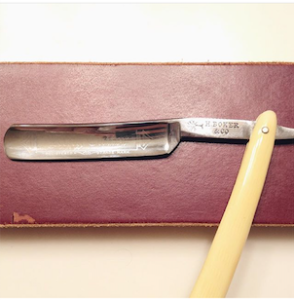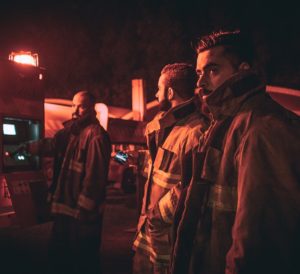Shaving is tedious – a chore I’ve never delighted in or enjoyed. It’s just something I endured. But I was watching a James Bond movie about seven years ago, and there was a scene where our hero was shaving with a straight razor (or rather being shaved by one of his “love interests”, but that’s besides the point).
“Now, that’s interesting,” I thought to myself.
Do you ever have moments when something grabs your attention and lodges itself into your imagination, such that you can’t ignore it? I thought about straight razors for the better part of a week after watching that movie, before I finally called my father and asked if he still had Gido’s straight razor.
My grandfather (Gido) passed away when I was seven. A poor Ukrainian farmer, he didn’t leave much behind after his death in terms of possessions, but my father had his old straight razor. I remember him keeping it in his night table. It was something to be feared. My father showed it to me once when I was ten, with a stern warning.
“I want you to know it’s here, but don’t you touch it,” he said. “It’ll take your finger off.” You’d have thought he was showing me a loaded gun.
But after watching the James Bond movie, and having reached the ripe age of 35, I asked him again about the razor. This time, he handed it to me with hardly a word.
The razor was not at all like I’d remembered it. It was dull and tarnished and was far from ‘shave-ready’. In its condition, it would have been best used as a letter-opener. But for some reason I couldn’t escape it. Something was compelling me to pursue this, so I sent it away to be properly honed and restored. As best I can figure, my grandfather’s razor, a Boker ‘King Cutter’, was made in Solingen, Germany around 1935. When I got it back, it looked brand new and sharp as a lightsaber.
 Now that I had the razor, I had to figure out what to do with it. I started asking around town about how to properly use the thing. I figured surely there must be a barber or an “old-timer” who knew how to shave with a straight razor without slicing your throat. As I asked around, one name kept coming up.
Now that I had the razor, I had to figure out what to do with it. I started asking around town about how to properly use the thing. I figured surely there must be a barber or an “old-timer” who knew how to shave with a straight razor without slicing your throat. As I asked around, one name kept coming up.
“You gotta talk to Pete”.
Surprisingly, “Pete” was not an old-timer at all. It turned out he was a guy my age who happened to be a firefighter here in town. I’d met Pete in passing a few times, but it was always brief. I wasn’t really sure how to get in touch with him, so I let it slide and took to YouTube.
Learning to shave with a straight razor is everything you’d expect it to be. This is old technology, dating back hundreds (maybe thousands?) of years. There are no safety mechanisms, and everything you’ve heard about how sharp these things are is true. It is a painful and bloody experience, and to be honest, even now I can’t tell you why I was so committed. There is no sense to it at all, other than the fact that for some inexplicable reason I felt compelled to master this thing.
Weeks went by. A little more YouTube. A little less blood, but still, it was starting to become clear I needed help. I decided to phone Pete. I looked him up in the phone book and, after putting it off for three days, I finally called and left the most awkward phone message I’ve ever recorded.
“Hi, uh, Pete? My name is Keith Kitchen. I inherited my grandfather’s straight razor and everyone says you’re the guy to learn what to do with this thing. Anyway, I know this is kind of weird and out of the blue, so if you don’t call me back, I totally understand, but… yeah.”
Literally ten minutes later, I got a call from Pete. “Hey, is this Keith? Pete here. C’mon down to the Fire Hall.”
We got together and had a great visit. Pete had me over a few times to learn how to hone and strop a razor, and gave me a few much-needed pointers.
Before I knew it, I had not only mastered the art of a straight razor shave, I was soon buying old razors off eBay, restoring and honing them, and selling them for a tidy little profit. Pete and I became good friends.
A few years later our community suffered a bad house fire. Our fire department prides itself on a quick response time, but on this particular afternoon they were severely delayed by onlookers in the area who congested the streets, preventing the fire engines from getting through. One of my friends, who serves on the auxiliary, had to get out of his vehicle and run three blocks with his turnout gear (air tank, helmet and protective clothing) due to the traffic. In the end, two houses were lost and there was a lot of noise in the community over what went wrong.
The day after the fire I was downtown, driving past the Firehall, and something in me said, “You need to stop and talk to Pete.”
I ignored it and kept driving. By the time I’d gone four blocks, the feeling became such that I couldn’t disregard it anymore. I turned around and headed back to the Firehall.
Pete and I had a long talk about the events of the day before, and the unfair criticism the fire department was receiving. I listened and told Pete I was on his side, and also that I was praying for the folks at the fire department.
As I was leaving, I said to Pete, “I don’t know if the department has a chaplain, and I’m not offering that, but if you ever need support or someone to talk to, I’m here for you.”
It was a holy moment. Pete thanked me. And I left.
 About a year ago, Pete called me up and asked if we could go for coffee. When we met, he told me about the fire department’s need for someone to be available to care for the men and women who watch over our city. He asked me if I’d consider being their chaplain. I told him I wasn’t the guy for the job. Firefighters are tough people. Physically and mentally fit. They rappel from wind turbines and rush into burning buildings. I sing about my feelings for a living. What would I have in common with them? (Though, to my credit, I DO shave with a straight razor now, so…)
About a year ago, Pete called me up and asked if we could go for coffee. When we met, he told me about the fire department’s need for someone to be available to care for the men and women who watch over our city. He asked me if I’d consider being their chaplain. I told him I wasn’t the guy for the job. Firefighters are tough people. Physically and mentally fit. They rappel from wind turbines and rush into burning buildings. I sing about my feelings for a living. What would I have in common with them? (Though, to my credit, I DO shave with a straight razor now, so…)
Pete insisted, and I accepted, and what followed has been some of the most meaningful ministry I’ve engaged in, during all my years of being a pastor. They are extraordinary people and I’m sure I’ve gained far more from our time together than I’ve contributed. The fact that in 2018, in an increasingly secular Canada, a fire department would call on a pastor to help is no small thing.
 So here’s what I learned. The Holy Spirit is always moving. Always working. Often in ways that are imperceptible, and through streams we can hardly trace. Like the compulsion to stop in at the Firehall that day. The thought that I needed to call a stranger about a straight razor. The fascination with this ancient technology. I suppose even the decision to watch a James Bond movie one night.
So here’s what I learned. The Holy Spirit is always moving. Always working. Often in ways that are imperceptible, and through streams we can hardly trace. Like the compulsion to stop in at the Firehall that day. The thought that I needed to call a stranger about a straight razor. The fascination with this ancient technology. I suppose even the decision to watch a James Bond movie one night.
Don’t be afraid to pay attention and follow those subtle nudges. In fact, we should expect them as we are being moved along, written into a grander story than any of us can imagine.
Never Been to War by Keith Kitchen, from his latest CD “Orbits”:
Visit his website to find out more about Keith and his music.
You can purchase and find out more about his latest CD “Orbits” here or on Bandcamp.









Great Story – thanks for the reminder that the Holy Spirit is directing and we need to avail ourselves to Him!